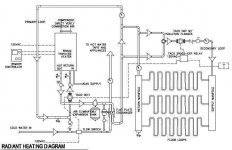Jerry,
I don't know if they still make them, but I heat with a Paloma Pak gas boiler. It is made from a Paloma tankless water heater with a NEGEA (New England Gas and Electric Assn., I think it was.)
Installed it in 1980 and replaced the heating unit of it this past Winter, just because I had a spare on hand from a couple years ago when I thought it went bad.
My house is well insulated 1900 SF and it has never failed to keep it up to the thermostat setting, at least to the 13 below that I do remember, the Winter I got my upstairs plastered and was told by the plasterer to leave the windows open to let the water from the plaster go out the windows. He called me a couple days later to ask how all was, told em to JEEZ, close the windows, I didn't mean at that temperature.
I said I don't know if they still make the boiler. I know they still make the tankless water heater. As I said I bought 1, 2 years ago. 43 thou BTU, 36 thou net, and heats my house. I have about 75% of my exterior walls run with baseboard, so think I get more heat input than with the "correct" footage for that 36 thou.
Contrary to Ag, I don't think you have to worry about your flow rate. This unit, at least, requires water to be flowing, and in a boiler scenario, that flow is a suction on the output side of the gas control valve. If there is no pressure differential, the burner will not light.
Also, you will have a closed loop so all the lime and the like will line the tubing and only make up water from leaks that you might have will enter. Minimal scaling. As a water heater, it would need to be descaled on a regular basis because every gallon you heat will be new water, new scale.
You might try tanklesswaterheaters.ca
I emailed them at "sales@ the above.
Cheers,
George
Man, I don't know what my home made wine comes in at, but just went out to smoke one and drink a glass and gotta squint to type the last of this.
New batch to come in about 2 weeks, this year's squeezings. I don't know what to make. Barolo, Pinot Noir, Sauvignon Blanc, last season. Year and a half old dandelion still not bottled. Kick in the ass wine, last time I tasted, kinda like a hay mow. POTENT!!






 Its almost never a smart way to go, and compensating for less-than-optimal design with excess capacity is a particularly brutal mistake in a heating system. You'll pay for that mistake for years.
Its almost never a smart way to go, and compensating for less-than-optimal design with excess capacity is a particularly brutal mistake in a heating system. You'll pay for that mistake for years.